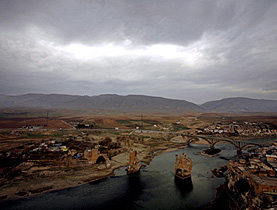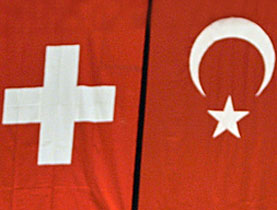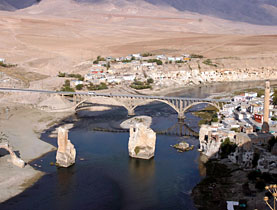Swiss halt work on controversial dam project

The government is suspending its financial guarantee for Swiss companies involved in the controversial Ilisu hydro-power plant in southeastern Turkey.
Non-governmental organisations have welcomed the decision announced in a joint statement by the Swiss, Austrian and German authorities on Tuesday.
The three governments agreed that the dam project must meet around 150 conditions relating to impacts on the environment, cultural heritage sites, neighbouring states and the relocation of people in flood zones.
The state-funded Swiss Export Risk Insurance said Turkey had failed to meet them and ordered four Swiss engineering and consulting companies – Alstom, Colenco, Maggia and Stucky – to halt their work.
The agency said it would review the situation in June 2009 to decide whether SFr225 million ($199 million) in financial cover could be reinstated.
“Turkey was notified of the decision. But it does not necessarily mean that we pull out,” said Sonja Kohler of the Swiss Export Risk Insurance agency.
She said the agreement gives Turkey another 180 days to comply with the standards, which were set by the World Bank and other international institutions.
“Turkey made significant progress over the past few months, notably providing timetables for implementing measures. But this is not sufficient,” Kohler added.
Resettlement
In October Turkey was served notice to honour its pledges made over the construction of the hydro-power project on the River Tigris.
The dam near the Syrian border will be one of the largest in Turkey. It is scheduled for completion by 2013. The Turkish government says it will produce 3,800 gigawatts of power without producing millions of tons of greenhouse gas.
However, opponents of the project in the mainly Kurdish region of the country have warned the flood would consume dozens of towns and destroy archaeological treasures, including the ancient fortress city of Hasankeyf.
An estimated 60,000 people will have to be resettled as part of the project, according to non-governmental organisations.
No representatives of the Swiss companies or Turkish government were immediately available for comment, but an undated statement on the Turkish foreign ministry website disputes those claims. Only part of Hasankeyf will be flooded and 15,000 people will have to be resettled, it said.
“If the 65 million people of Turkey are to be enabled to enjoy a modern lifestyle, there will be occasions when the interests of archaeology have to be subordinated to those of economic development,” the statement said.
The Austrian turbine producer Andritz, which is part of the international consortium, said the announcement was disappointing.
“It gives Turkey the wrong signal and jeopardises business contracts for our companies hit by economic crisis,” chief executive Wolfgang Leitner was quoted by the ATS news agency.
Several Swiss government ministers have held talks with their Turkish counterparts in Ankara over the past few months.

More
Export Risk Insurance
Public pressure
Marlies Bänziger, a Green parliamentarian who has been campaigning for Switzerland to withdraw support for the project, says the suspension is a step in the right direction.
“I hope it spells the end of an absurd project – the prototype of misguided business venture,” she said.
Bänziger says public pressure is an important factor in combating the project, and she is convinced that it helped trigger the decision by the authorities.
The non-governmental organisation, the Berne Declaration, also welcomed the unprecedented decision.
“We will make sure that the government pulls the plug for good in six months,” said Christine Eberlein.
The NGO said the withdrawal of German, Swiss and Austrian support means that Turkey will be short €500 million (SFr759 million) in foreign investment for the hydro-power project.
The chances of finding other investors are limited because of the global credit crunch, according to Eberlein.
swissinfo, Urs Geiser
The Ilisu dam is part of a larger hydro-power project drawn up by the Turkish authorities in 1991. Twenty-two dams and 19 power plants are planned on the Tigris and Euphrates rivers in the south east of the country.
The Ilisu dam will be 135 metres high and 1,820 metres wide holding a reservoir of 10.4 billion cubic metres of water.
The Turkish authorities pledged to fulfil more than 150 standards set by the World Bank and other international institutions to win investors for the project.
NGOs say up to 60,000 people in the majority Kurdish region of Turkey will have to be resettled. The Turkish government says the number is closer to 15,000.
Four Swiss companies – Alstom Switzerland, Colenco, Maggia and Stucky – are part of an international consortium.
They were granted an export risk guarantee from the Swiss government worth SFr225 million, alongside credits from Austria and Germany.
A previous consortium collapsed in 2002 when several players pulled out following fierce criticism from environmental groups and other pressure groups.


In compliance with the JTI standards
More: SWI swissinfo.ch certified by the Journalism Trust Initiative



You can find an overview of ongoing debates with our journalists here . Please join us!
If you want to start a conversation about a topic raised in this article or want to report factual errors, email us at english@swissinfo.ch.